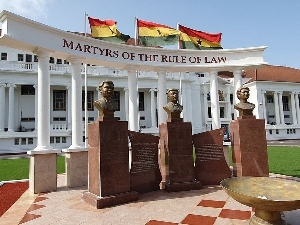In Ghana, the Supreme Court stands as the ultimate guardian of justice, responsible for interpreting the 1992 Constitution, a reflection of the dreams and struggles of the Ghanaian people. However, what happens when the court issues rulings that seem unjust or inconsistent with the Constitution? Who has the authority to challenge these decisions? Is the Supreme Court always right in its interpretations?
The power of the Supreme Court is significant, but it must be balanced with accountability. While its decisions are generally considered final, the Constitution allows for self-correction. The courts can revisit and amend past rulings when new evidence or arguments arise. Yet, when the Supreme Court misinterprets constitutional provisions, we must ask: who corrects these mistakes?
The executive branch, led by the President, plays a vital role in governance. Although the executive cannot directly overturn Supreme Court rulings, it can advocate for legislative changes or propose constitutional amendments. If a ruling undermines public welfare, the President can rally support and work with Parliament to clarify or challenge the court's interpretation. This, however, requires strong political will and public backing.
Parliament serves as a crucial check on both the executive and the judiciary. It has the power to impeach judges, propose amendments, and pass new laws. Recently, a significant controversy erupted when the Speaker of Parliament, Alban Bagbin, declared the seats of some Members of Parliament vacant. This decision was based on Article 97(g) and (h) of the Constitution, which stipulate that an MP’s seat becomes vacant if they declare their intention to contest as an independent candidate or if they join another political party. This ruling referenced a precedent set by former Speaker Mike Oquaye, leading to intense debate between the majority and minority parties. The minority saw this as a necessary enforcement of constitutional provisions, while the majority argued it undermined their rights and the electoral process.
If the Supreme Court is called upon to interpret this matter further, it could reinforce or challenge the authority of Parliament in enforcing its rules. Yet, the question remains: who holds the Supreme Court accountable if its interpretations do not align with the spirit of democracy?
Ultimately, the responsibility of correcting the Supreme Court rests with the people of Ghana. Public opinion is a powerful force for accountability. When citizens express their concerns and demand change, they compel the executive and legislative branches to act. Grassroots movements can lead to legal reforms, constitutional amendments, or new cases that prompt the court to reconsider its previous interpretations.
In Ghana's democratic framework, the Supreme Court is not infallible. The power to correct its errors lies not only with the executive and Parliament but fundamentally with the people. The guardians of justice must remain vigilant and accountable to the citizens they serve. A genuine commitment to justice requires ongoing engagement to ensure that the ideals enshrined in the 1992 Constitution are upheld for everyone.
Opinions of Saturday, 2 November 2024
Columnist: Mileba Godwin Kwame



















